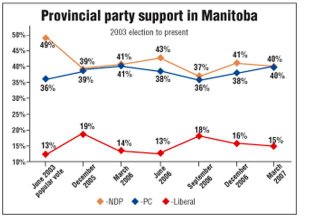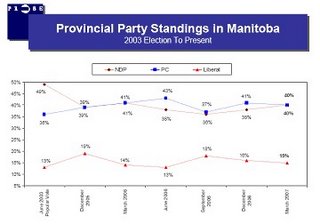In December, the Free Press reported: “Province-wide, the Tories have the support of 41 per cent of decided voters, slightly ahead of the NDP, who are at 38. The Liberals are at 16 per cent. The Green Party has the support of four per cent of decided voters, and one per cent of people said they would vote for another party."
But if you actually looked at the chart on Saturday showing Probe’s numbers since 2003, it said something else.
 The December numbers were reversed – 38% was shown as the PC number and 41% for the NDP.
The December numbers were reversed – 38% was shown as the PC number and 41% for the NDP.That makes it look like the NDP has gone down this month from December, when in fact it has gone up (albeit, it's all in the margin of error – if you accept Probe’s numbers, that is).
In fact, if you compare with the Probe's chart in their news release, that's not the only one that got screwed up. (We realize it might be hard to read here, but compare the two versions of the June 2006 numbers as well.)
 Well, apart from pointing out this f**ck up with the Freep art department, it brings us to reflect on another media outlet getting into the dodgy public domain polling game – with the CBC now having bought a few questions for themselves.
Well, apart from pointing out this f**ck up with the Freep art department, it brings us to reflect on another media outlet getting into the dodgy public domain polling game – with the CBC now having bought a few questions for themselves.We won't dwell on the problem that there is no way to compare and contrast the polls from different sources, as Probe is the only product out there that the media is buying. We trust the price was right.
Last night the CBC began reporting on their questions which asked respondents about the NDP government’s relative success on public issues such as health care, universities and colleges, the economy, public schools and the environment.
They say that in four of the five policy areas, Manitobans find the Doer NDP wanting -- that is, there are more people saying these areas are worse today than those who say they are better today.
In fact, the story on their website is titled: "Manitobans say NDP's performance is worse".
This, however, is not true even looking briefly at the reported numbers. A child could do better than the analysis offered on this one.
As we understood the charts broadcast last night (as the poll is not on their website this morning as they promised), they said regarding health care, 30% sayit is worse today than in 2003 as opposed to 25% who say it is better.
That's a five point spread between those who say it is better versus those who say it is worse. Not good, eh?
Similar results occurred regarding universities and colleges, economic management and public schools.
Only the environment bucked this trend at 15% bad versus 27% better.
Sounds like a crap sandwich for the NDP.
Case closed. Not so good for Doer’s gang.
Or is it?
Well, this picture totally leaves out any analysis of the people who said things were neither better nor worse, but the same in these topics.
And overall, on health, 49% said the same, as did 44% regarding universities and colleges, 49% on economic management and 52% on public schools. Oh, and 49% on the environment.
OK, so do you think these people were thinking these issues were OK or not OK before 2003, which was the premise of the question asked?
Considering the government got one of the largest majorities in Manitoba history in 2003, did Manitobans think all these issues were in the crapper back then?
No, obviously not.
So, a more valid conclusion of the info is as follows, once one combines the same and better numbers:
- 65% of Manitobans say health care is good
- 62% say universities and colleges are good
- 64% say economic management is fine
- 64% say public schools are dandy
- and 76% say the environment is hunky-dory
To be fair to the Mother Corp, Lindsay Duncomb’s story last night was realatively balanced, even if they blew the better vs. worse aspect. The same can't be said, though, for Leslie McLaren's completely empty-headed piece on the radio this am. However, no attempt to explain what the “same” response meant was at all in evidence in either report.
So getting a correct analysis on government satisfaction on these issues was pretty much thrown out the window by the CBC, even if Probe has indeed accurately measured it to begin with -- which is by no means assured.
We hope the Mother Corp didn’t spend too much of the public’s money on these omnibus questions, because they surely are not very informative in result or interpretation.
(We also tried to check the CBC's policies on commissioning and reporting on polls, however that was impossible this morning as the website appears to be down. Hmmm. We recall it was down the last time we checked, too.)